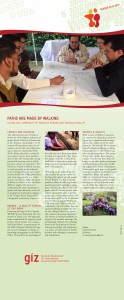The plurinational state of Bolivia shows one of the highest indicators of gender-based violence and feminicide in the Americas. Statistically, 7 in 10 women will experience some sort of violence in their life, most likely during´a romantic relationship (INE, 2016). Being otherwise a relatively non-violent society, these numbers derive from still considerably strong patriarchal structures and a widely prevalent culture of “machismo”.
Furthermore,women in Bolivia continue to work primarily in the informal sector, resulting in less access to socialsecurity, health care, labour protection, and, most importantly, to a stable income. In order to tackle this socialproblem in various sectors and from different angles, GIZ Bolivia iemphasizing the main-streaming ofgender and interculturality across allits programmes and projects organised in the “Grupo Temas Transversales”, a designated community of practice.
GENDER – A QUALITY FEATURE OF OUR WORK
Following the logic of the Capacity WORKS process framework, the community of practice is a self-organized body, comprised of the respective focal points of each project, two countrywide Focal Points, a representative of the AHK (German Chamber of Commerce) and colleagues in charge of knowledge management at the Bolivia Office. Nurtured by the knowledge of the collective, each focal point serves as much as a support for their respective project activities, as they do as trailblazer in areas where applying gender sensitive approaches does not seem to be apparent. Operating on the basis of its own annual plan, the group counts on the financial support of each project of GIZ Bolivia.
The financial independency allows for offering further sensitization and knowledge management´activities, the dissemination of gender related, country specific information among field staff, as well as conducting commemorative events, like the International Day for the Elimination of Violence against Women on 25th November. Additionally, the community of practice offers internal capacity-building strategies like oneon- one collegial advice on request, and conducts desayunos dinamicos, also known as business breakfasts, to initiate its bi-monthly meetings. The methodology enhances the exchange between the focal points to harness existing knowledge and experiences as a source of information in further activities with colleagues, counterparts and beneficiaries.
CONTEXT AND INITIATIVE
Gender equality concerning the access to financial resources and services is a key issue in order to promote women’s empowerment as well as economic growth and sustainable development. While the positive impact of financial inclusion is widely acknowledged, women remain disproportionately excluded from the formal financial system. The Cairo based regional programme “Promotion of the Microfinance Sector in the MENA Region (MFMR)” covering Egypt, Jordan, and the Palestinian Territories assists policymakers, regulators and relevant stakeholders in strengthening the legal and regulatory frameworks for financial inclusion with special focus on raising awareness of women’s distinct financial needs. To achieve this, MFMR draws on the Policy Brief: “Advancing African Women’s Financial Inclusion”, published by GIZ MFW4A revealing experience and lessons learnt from countries like Zambia, Mozambique and Ruanda where GIZ has accompanied similar reform processes.
GENDER – A QUALITY FEATURE OF OUR WORK
MFMR facilitates collaboration knowledge exchange and peer-to-peer learning at a regional and national level and between state, private sector and non-state actors. Together with the Arab Monetary Fund (AMF) and the Alliance for Financial Inclusion (AFI) GIZ MFMR launched the Financial Inclusion Initiative for the Arab Region (FIARI), secured much needed support for the formulation and implementation of a regional Action Plan for Women Financial Inclusion and the AFI Network Commitment to Gender and Women’s Financial Inclusion. MFMR efforts are highly recognized, and secured the GIZ programm commissioned by the German Federal Ministry for EconomicCooperation and Development additional EU financial support. In Egypt, MFMR works on women’s economic empowerment as part of itsoverall support on financial inclusion to the Central Bank of Egypt (CBE).
IMPACTS & RESULTS
With a series of different measures, the community of practice is promoting an intra-organizational learning process that makes use of the staff’s potential. This includes the incorporation of a capacity-building workshop on masculinities in GIZ Bolivia’s regular training programme. Two groups of men have already been trained as trainers to work with their male colleagues to question gender-stereotypes and discriminating behaviour within the organization and its counterparts. Furthermore, good practices in gender mainstreaming from each project were compiled to design and produce a folder in a functional format. It now serves as a manual of useful examples for everyone to inspire future activities. In 2018, the elaboration of an amplified digital version is intended.
The full information can be downloaded here: 2018 EN GenderAward RollUp Bolivia
The competition entry can be downloaded. (In Spanish) 2018 ES Project Documentation GIZ Bolivia Hace Camino Al Andar El Grupo De Temas Transversales
Have a look at the results of the second screen survey during the Gender Award Ceremony:
———————————————
Contact:
Elisabeth Girrbach
GIZ Bolivia
E: elisabeth.girrbach@giz.de






